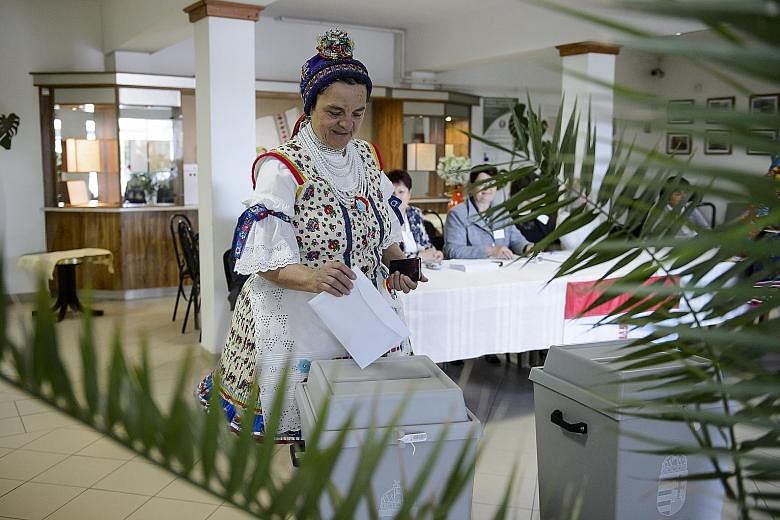BRUSSELS • Europeans voted yesterday in the final day of a marathon election that is expected to further dent traditional pro-European Union parties and bolster the nationalist fringe in the European Parliament, potentially putting the brakes on collective action in economic and foreign policy.
Polls opened at noon Singapore time yesterday in the east of the bloc, and were due to close in Italy at 5am Singapore time today.
Seven of the EU's 28 states had already voted, with the rest joining in yesterday in what is the world's biggest democratic exercise after India.
Right-wing populists top opinion polls in two of the big four member states: Italy and supposedly exiting Britain.
They could also win in France, rattling a pro-Union campaign championed by the country's centrist President Emmanuel Macron.
However, exit polls in some countries that have already voted have given pro-EU parties some comfort.
The Dutch Labour party, all but written off, looks to have finished first. The party is led by current EU deputy chief executive Frans Timmermans, who is also the EU Socialists' candidate for European Commission president.
In the Netherlands, pro-Union parties scored 70 per cent - up three points on the last European Parliament vote in 2014 - and left the upstart anti-immigration party of Mr Thierry Baudet in fourth place with 11 per cent.
The Dutch also turned out in bigger numbers, albeit at just 41 per cent. This reinforced hopes in Brussels of reversing a 40-year trend of a declining turnout, which critics cite as a "democratic deficit" that undermines the legitimacy of EU lawmaking.
An exit poll after last Friday's vote in deeply pro-EU Ireland also pointed to an expected "Green Wave".
Across the bloc, concerns about climate change and the environment could bolster the pro-EU Greens group. This could also mean tighter regulations for industry and for the terms the EU might set for partners seeking trade accords.
The results will be released once all member countries have voted.
The challenges facing the European project include unprecedented transatlantic slights from a United States president who fetes Europe's populists, border rows among its own members over migrants, and an economy both hobbled by public debt and challenged by the rise of China.
But parties seeking collective action on shared issues such as trade, security, migration or climate change should still dominate, albeit with a smaller overall majority.
The election results will usher in weeks of bargaining among parties to form a stable majority in Parliament, and among national leaders to choose successors to European Commission President Jean-Claude Juncker and other top EU officials.
REUTERS

